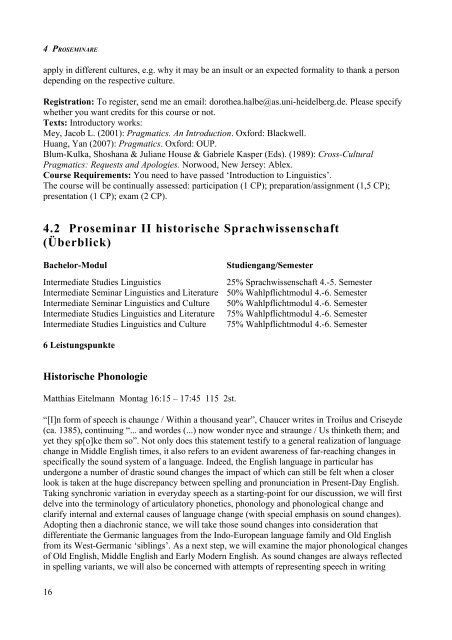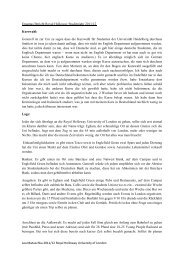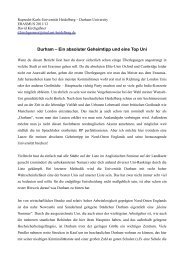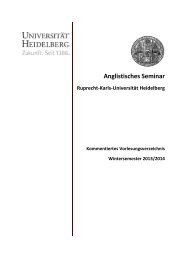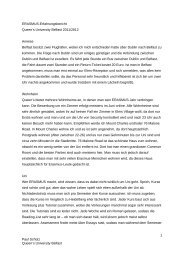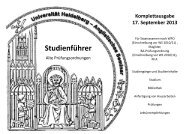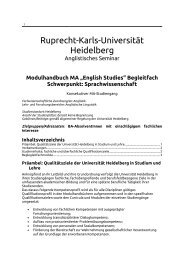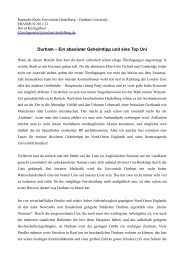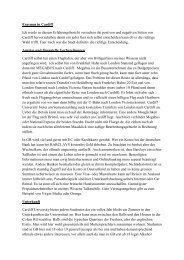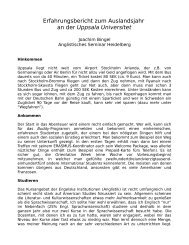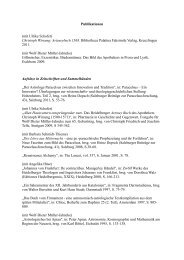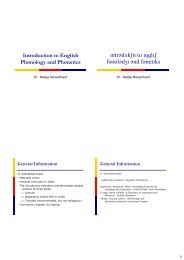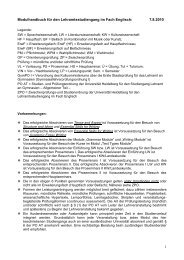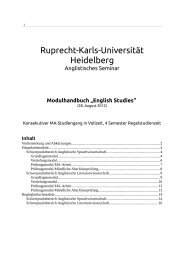Kommentiertes Vorlesungsverzeichnis Anglistik Heidelberg SS 2008
Kommentiertes Vorlesungsverzeichnis Anglistik Heidelberg SS 2008
Kommentiertes Vorlesungsverzeichnis Anglistik Heidelberg SS 2008
Create successful ePaper yourself
Turn your PDF publications into a flip-book with our unique Google optimized e-Paper software.
4 PROSEMINARE<br />
apply in different cultures, e.g. why it may be an insult or an expected formality to thank a person<br />
depending on the respective culture.<br />
Registration: To register, send me an email: dorothea.halbe@as.uni-heidelberg.de. Please specify<br />
whether you want credits for this course or not.<br />
Texts: Introductory works:<br />
Mey, Jacob L. (2001): Pragmatics. An Introduction. Oxford: Blackwell.<br />
Huang, Yan (2007): Pragmatics. Oxford: OUP.<br />
Blum-Kulka, Shoshana & Juliane House & Gabriele Kasper (Eds). (1989): Cross-Cultural<br />
Pragmatics: Requests and Apologies. Norwood, New Jersey: Ablex.<br />
Course Requirements: You need to have passed ‘Introduction to Linguistics’.<br />
The course will be continually assessed: participation (1 CP); preparation/assignment (1,5 CP);<br />
presentation (1 CP); exam (2 CP).<br />
4.2 Proseminar II historische Sprachwissenschaft<br />
(Überblick)<br />
Bachelor-Modul Studiengang/Semester<br />
Intermediate Studies Linguistics 25% Sprachwissenschaft 4.-5. Semester<br />
Intermediate Seminar Linguistics and Literature 50% Wahlpflichtmodul 4.-6. Semester<br />
Intermediate Seminar Linguistics and Culture 50% Wahlpflichtmodul 4.-6. Semester<br />
Intermediate Studies Linguistics and Literature 75% Wahlpflichtmodul 4.-6. Semester<br />
Intermediate Studies Linguistics and Culture 75% Wahlpflichtmodul 4.-6. Semester<br />
6 Leistungspunkte<br />
Historische Phonologie<br />
Matthias Eitelmann Montag 16:15 – 17:45 115 2st.<br />
“[I]n form of speech is chaunge / Within a thousand year”, Chaucer writes in Troilus and Criseyde<br />
(ca. 1385), continuing “... and wordes (...) now wonder nyce and straunge / Us thinketh them; and<br />
yet they sp[o]ke them so”. Not only does this statement testify to a general realization of language<br />
change in Middle English times, it also refers to an evident awareness of far-reaching changes in<br />
specifically the sound system of a language. Indeed, the English language in particular has<br />
undergone a number of drastic sound changes the impact of which can still be felt when a closer<br />
look is taken at the huge discrepancy between spelling and pronunciation in Present-Day English.<br />
Taking synchronic variation in everyday speech as a starting-point for our discussion, we will first<br />
delve into the terminology of articulatory phonetics, phonology and phonological change and<br />
clarify internal and external causes of language change (with special emphasis on sound changes).<br />
Adopting then a diachronic stance, we will take those sound changes into consideration that<br />
differentiate the Germanic languages from the Indo-European language family and Old English<br />
from its West-Germanic ‘siblings’. As a next step, we will examine the major phonological changes<br />
of Old English, Middle English and Early Modern English. As sound changes are always reflected<br />
in spelling variants, we will also be concerned with attempts of representing speech in writing<br />
16


